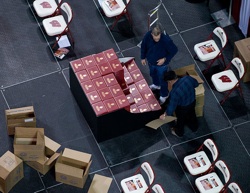Commencement benefits from behind-the-scenes work
By Stacy Forster and Susannah Brooks
Thousands of graduating students will make their way across the commencement stage this weekend, posing for photos, hearing the hoots from family members high up in the Kohl Center seats and beaming with pride.
But to get them all in and out of the arena, through commencement and off into their post UW–Madison lives requires the efforts of hundreds of people working behind the scenes to ensure a smooth weekend of ceremonies.
“Commencement is a community event, and it takes a community of people to put it together and make it happen,” says David Musolf, secretary of the faculty, who estimates he will have worked at 135 commencements after this weekend’s ceremonies.
Much of the logistical work is done by Joe Farrenkopf, administrative program specialist and commencement coordinator in the Office of the Secretary of the Faculty.
“He really is the person that on a day-to-day basis is focusing on much of the minutiae of the planning,” Musolf says. “His attention to detail is just superb…and he coordinates all of the details that go in to the planning.”
Flowers
The colors of commencement may be the black of the graduates’ robes and the cardinal and white representing UW–Madison, but the ceremony wouldn’t be the same without the greenery decorating the stage.

These ferns will grace the stage at commencement.
Three university gardeners are tasked with setting up and arranging the flowers and ferns that line the front of the stage.
Spring is a busy time on campus for the gardeners, who are also spending their hours getting perennials and annuals planted around campus. But they’ll bring flowers and ferns to the Kohl Center on Friday morning, just hours before the first commencement ceremony is set to begin, and spend the day arranging them on the stage.
“It takes most of the day, on and off,” says gardener Patricia Radle.
The ferns, which are tended by gardener Dean Noble, are used year round across campus and brought in to service for commencement – many are on stage year after year. Noble looks for small pieces to move into their own pots, which he then nurtures to full size.
Gardener Larry Kraak says setting up the ferns and mums (they’re replaced by poinsettias at winter commencement) takes less time than arranging the cut flowers.
“We put a few in, step back and see,” Kraak says. “I tend to look from about three different directions to see if anything is out of balance.”
After spending the weekend as part of the backdrop for every graduate’s march across stage, the cut flowers are delivered to offices around campus on Monday morning, while the ferns go back to the greenhouse and to other campus events.
“You do get kind of a good feeling when someone comments on how it looked,” Kraak says.
Commencement programs
There are about 6,300 students who’ll march across the commencement stage, and “each person has a story,” says Nancy Brower, senior editor in University Communications and Marketing, who works with the Office of the Secretary of the Faculty to produce the program for commencement.

Work on the program began weeks ago, when senior artist Nancy Rinehart sifted through photographs of campus to find appropriate seasonal images and developed a dozen potential covers to run past Musolf, who chooses the cover. This year, Musolf was interested in photos of Union South, ultimately choosing one of the new building’s southwest façade – and a few umbrellas that resemble spring flowers — bathed in the setting sun. (Signaling the end of an era for graduates? We’ll leave the interpretation of the imagery to others.)
The inside of the program comes together quickly. This year, after weeks of work, Farrenkopf delivered the names of graduates to University Communications on April 23, leaving just two weeks for the book to be laid out and edited. After it went to the printer on May 4, Farrenkopf and Brower continued to pore over proofs, looking for final edits to make.
Once printed, the programs are delivered directly to the Kohl Center the day before the ceremonies begin, where they’ll be placed on graduates’ chairs, distributed to proud parents and family members, and eventually tucked into scrapbooks or memory boxes.
“The reason the cover is a photograph is that having images within it reminds you of where you went to school,” Rinehart says. “It is something that people keep.”
Marshals
While working as a commencement marshal, one responsibility stands above all others: Tell graduates what to do at their ceremonies.
It’s all part of the critical role of the marshals in helping the Office of the Secretary of the Faculty stage a smooth commencement, says Svetlana T. Karpe. That means moving graduates around the Kohl Center floor, keeping them from tripping and looking out for any inappropriate behavior, among other things, says Karpe, director of the Undergraduate Research Scholars program in the College of Letters and Science, who has worked as a marshal for the last decade.
“It’s fun times,” says Karpe, who enjoys commencement so much she rearranged a vacation to help this weekend. “I’m more than happy to keep doing it.”
Karpe will don the marshals’ cardinal robe with academic hood three times this weekend – at Friday’s event for those receiving advanced degrees, and one undergraduate ceremony on both Saturday and Sunday. She will be among 26 marshals for Friday night; the number at the Saturday and Sunday ceremonies range from 15 to 18.
Karpe’s favorite part of commencement is “seeing the students when they’re successful and happy, and getting a chance to say goodbye in that official moment,” she says. “I like rituals in general – the celebration and marking of not just time, but success. I would say that’s the most important part.”
How does she pass the time during the hours-long ceremonies? Talking with graduates as they file by and scoping out the latest in footwear, Karpe says.
“We’re on the side, so we have clear lines of vision, and to watch the footwear trends change every year is interesting,” she says.
Name readers
For the third time, Anneliese Dickinson, a voice specialist in the master of fine arts acting program, will help pronounce names as graduates cross the stage. Aside from drinking water, she can’t prepare much.

Workers prepare diploma covers for distribution to graduates.
“Your adrenaline gets going; the key is confidence,” says Dickinson. “It stinks to mispronounce someone’s name, but if you act confident and don’t hesitate, only a few people will know you messed up.”
The readers have it down to a system. One person briefs candidates (and fixes stray tassels). One person scans for unconventional spellings or prank names, circles or crosses out as needed, and hands it to the reader. Patricia Boyette, professor of theatre and drama, monitors flow, telling readers to slow down or speed up in order to avoid a pileup and, ideally, to have each name said just as they shake hands.
“It sounds dumb, but you have to stay alert to switch between name types,” says Dickinson. “You’ll have 20 Indian names in a row; suddenly, an Italian name looks like nonsense for a second. With quick syntax changes, you can’t get too comfy.”
Any hints?
“Misspell it if you need to! We only have time for a glance; if your name is Karri, write down ‘Carrie’. We’ll get it right.”
Interpreters/captions/disability services
Ben Fraser, director of guest services at the Kohl Center, works hard to ensure that patrons with hearing difficulties will enjoy the celebration. American Sign Language interpretation will be available in a reserved area with a clear view of the stage; real-time captioning flashes on the Jumbotron so the entire arena can see what’s being said.
“The McBurney Center recommended that the interpreters become familiar with the University of Wisconsin language – for example, the singing of ‘Varsity,’” says Fraser.
Fraser works with Farrenkopf to access agendas, song lyrics, scripts and anything else he can pass on to the interpreters, contracted through Purple Language Services, to lessen the load on the day of the event.
“Anything that might be specific to graduation or campus, they’ll spend time prepping,” says Peggy Weaver, Madison manager for Purple. “They’ll read speeches, pull out words that there might not be an exact equivalent for, modify if an expansion is needed.”
Six interpreters will work in teams of two, trading off through each of the two-hour ceremonies.
“Research has shown that after about 20 minutes, the quality of interpreting tends to deteriorate,” says Weaver. “Your brain is actually doing a lot of processing – plus, it gets physically exhausting. Your team can help if you space out on a word or need a breather.”
Tags: commencement, events

